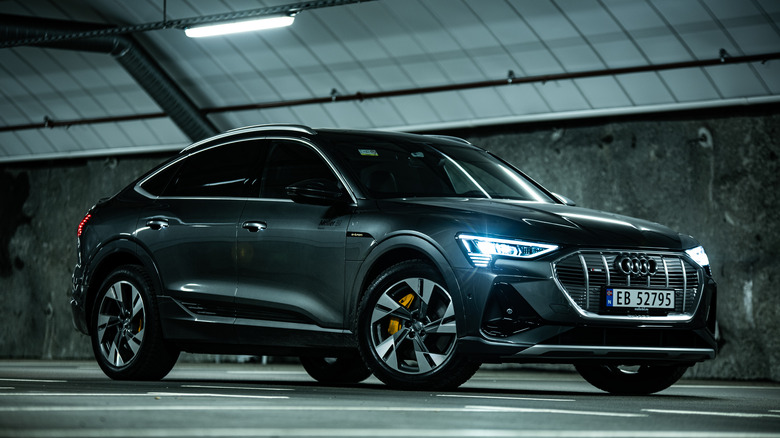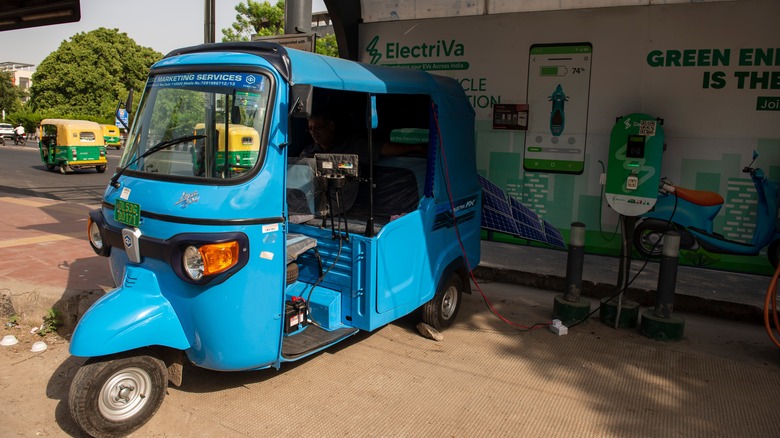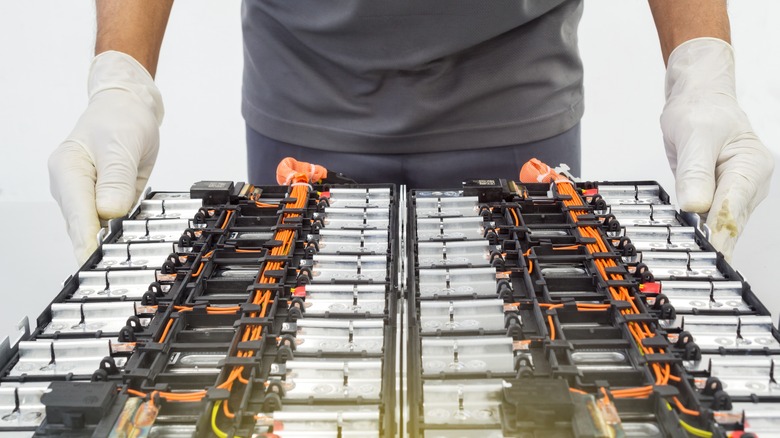Audi Has Great Idea For Recycling E-Tron Batteries
Audi has been making significant headway in the EV marketplace lately. Its E-Tron sports an estimated range of about 226 miles and a battery charge time of just 30 minutes to achieve an 80% capacity with a fast public charger, according to Audi USA. Electric vehicles are making significant progress in breaking into the U.S. marketplace, but with this turn toward electric vehicles comes a worry that the eco-friendly claims that drive consumers to purchase one are ill-defined or nebulous. One topic of great debate is what to do with defunct electric vehicle batteries. Batteries are famously hard to dispose of, and these large units pose a unique environmental protection issue if manufacturers aren't careful with their recycling protocols. But Audi is doing something unique with its old batteries, and, in the process, may just reimagine what car batteries can be used for once their utility in a vehicle has expired.
Creating reusable batteries is a great win for the environment, and it can also reimagine business opportunities in a number of unique geographical locations and enterprise arenas (via National Grid). Audi's new plan to recycle batteries is one such effort aimed at providing this spark in a unique and thriving arena. Audi is partnered with a joint German and Indian startup venture called Nunam and has developed an electric-powered rickshaw that can make full use of these batteries that can no longer power a full-blown automobile.
The rickshaw project can reinvigorate mobility, enterprise, and environmental sustainability in the Global South
A rickshaw may be a foreign concept to those who have never traveled beyond the confines of the United States. However, they are a vibrant and omnipresent component of roadways in cities and countryside locations throughout the rest of the world. Nations commonly referred to as belonging to the Global South play host to millions of rickshaw carts (over 210 million in India alone, according to Climateworks), and it's common for tourists and local business people alike to make use of these vehicles for all kinds of transportation needs. Colloquially, these carts are often known as tuk-tuks, in a nod to the iconic noise of the two-stroke engine traditionally used for propulsion. Two-stroke engines can run for what seems like forever, but they are immensely damaging to the environment in the process. A change over to electric powered rickshaws can make for a transportation industry that doesn't rely on the same kind of gasoline power that causes so much harm to the air and environment, and can cut down on the expense of running these reliable machines in the process.
A rickshaw is a two- or three-wheeled cart that can be configured to bring passengers from place to place, or goods to a market. Rickshaws are equally at home in rural farming communities and bustling tourist destinations around the world. And they can carry more people than you'd expect.
EV batteries can also be recycled for a third life beyond this use
According to the Union of Concerned Scientists, EV batteries retain a functional capacity of over two-thirds of their original storage capability after eight to 12 years of use on the road. What's more, with a continuing rise in the number of new electric vehicles being sold each year and efforts to significantly alter new car sales to focus heavily on EV models in the next 10 to 15 years (via Deloitte), there will be an enormous supply of decommissioned EV batteries in the very near future. Researchers have gone about creating strategies to recycle the metals involved in constructing these heavy battery packs. However, reusing the batteries appears to be a highly promising option that requires minimal processing effort. For instance, BMW Group reports that Coldplay's most recent tour was powered by decommissioned BMW EV batteries. Building electric-powered rickshaws with batteries that are no longer in traditional electric vehicles is a great way to reuse these power packs. But these batteries are also poised to provide a third life beyond use in applications such as electric rickshaws. The Union of Concerned Scientists also notes that homeowners might see a benefit in bringing retired batteries into their home in order to store excess power generated through solar collectors or other renewable sources in order to reduce overall electricity costs from grid based power supplies.
The possibilities built into refurbishment and reuse certainly appear endless and their utility spans across continents and application opportunities.


